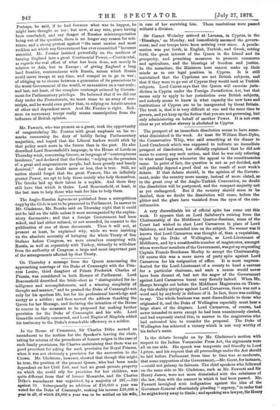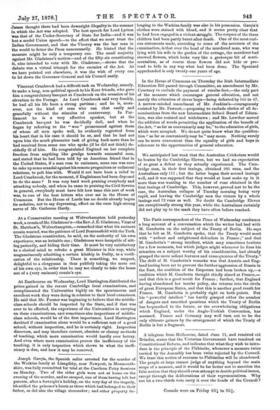In the debate brought on by Mr. Gladstone's motion with
respect to the Indian Vernacular Press Act, the arguments were all on one side. His speech was temperate and friendly to Lord Lytton, and his request that all proceedings under the Act should be laid before Parliament from time to time was so moderate, that some supporters of the Government,—Mr. Gorst, for instance, —could not gainsay its fairness. The chief speakers who followed on the same side as Mr. Gladstone, such as Mr. Fawcett and Sir Henry James, were not more dissatisfied with the substance of the law, than with the manner in which it had been passed. Mr. Fawcett inveighed with indignation against the idea of the Governor-General effeminately pleading "urgency," in order that he might hurry away to Simla ; and speaking asa lawyer, Sirllenry
James thought there had been downright illegality in the manner in which the Act was adopted. The best speech for Lord Lytton was that of the Under-Secretary of State for India—and it was but a model Union speech—to the effect that we must trust the Indian Government, and that the Viceroy was the last man in the world to fetter the Press unnecessarily. He hinted that the measure might be only a temporary one. The small majority against Mr. Gladstone's motion—and of the fifty-six constituting it, nine intended to vote with Mr. Gladstone,—shows that the debate was a virtual triumph for the enemies of the Act. As we have pointed out elsewhere, it was the wish of every one to let down the Governor-General and his Council easily.



































 Previous page
Previous page